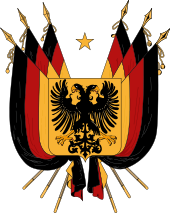
Back برلمان فرانكفورت Arabic Parlament de Frankfurt Catalan Frankfurtský parlament Czech Франкфурт парламенчĕ CV Frankfurterparlamentet Danish Frankfurter Nationalversammlung German Κοινοβούλιο της Φραγκφούρτης Greek Nacia Asembleo (Germanio 1848) Esperanto Parlamento de Fráncfort Spanish Frankfurdi rahvuskogu Estonian
This article includes a list of general references, but it lacks sufficient corresponding inline citations. (May 2011) |
Frankfurt National Assembly Frankfurter Nationalversammlung | |
|---|---|
| German Empire | |
 Imperial Coat of arms | |
| History | |
| Founded | 18 May 1848 |
| Disbanded | 30 May 1849 |
| Preceded by | Federal Convention |
| Succeeded by | Federal Convention |
| Leadership | |
President | Frederich Lang (first) Wilhelm Loewe (last) |
Prime Minister | |
| Elections | |
First election | 1848 |
| Meeting place | |
 | |
| St. Paul's Church, Frankfurt am Main | |
| Stuttgart (rump parliament) | |
| Constitution | |
| Frankfurt Constitution | |
The Frankfurt Parliament (German: Frankfurter Nationalversammlung, literally Frankfurt National Assembly) was the first freely elected parliament for all German states, including the German-populated areas of the Austrian Empire,[1] elected on 1 May 1848 (see German federal election, 1848).[2]
The session was held from 18 May 1848 to 30 May 1849 in the Paulskirche at Frankfurt am Main.[3] Its existence was both part of and the result of the "March Revolution" within the states of the German Confederation.
After long and controversial debates, the assembly produced the so-called Frankfurt Constitution (Paulskirchenverfassung or St. Paul's Church Constitution, officially the Verfassung des Deutschen Reiches) which proclaimed a German Empire based on the principles of parliamentary democracy. This constitution fulfilled the main demands of the liberal and nationalist movements of the Vormärz and provided a foundation of basic rights, both of which stood in opposition to Metternich's system of Restoration. The parliament also proposed a constitutional monarchy headed by a hereditary emperor (Kaiser).
The Prussian king Frederick William IV refused to accept the office of "Emperor of the Germans" when it was offered to him on the grounds that such a constitution and such an offer were an abridgment of the rights of the princes of the individual German states. In the 20th century, however, major elements of the Frankfurt constitution became models for the Weimar Constitution of 1919 and the Basic Law for the Federal Republic of Germany of 1949.
- ^ Karl Obermann: Die Wahlen zur Frankfurter Nationalversammlung im Frühjahr 1848. Die Wahlvorgänge in den Staaten des Deutschen Bundes im Spiegel zeitgenössischer Quellen. Deutscher Verlag der Wissenschaften, Berlin 1985, ISBN 978-3-326-00142-5
- ^ Carr, William (1979) [1969]. A History of Germany 1815–1945. London: Edward Arnold. pp. 46–48. ISBN 978-0-7131-5433-7.
- ^ Schulze, Hagen (1998). Germany: A New History. Harvard University Press. p. 125. ISBN 978-0-674-00545-7.
© MMXXIII Rich X Search. We shall prevail. All rights reserved. Rich X Search